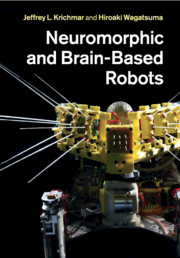Book contents
- Frontmatter
- Contents
- Contributors
- Preface
- Part I Introduction
- Part II Neuromorphic robots: biologically and neurally inspired designs
- Part III Brain-based robots: architectures and approaches
- Part IV Philosophical and theoretical considerations
- 10 From hardware and software to kernels and envelopes: a concept shift for robotics, developmental psychology, and brain sciences
- 11 Can cognitive developmental robotics cause a paradigm shift?
- 12 A look at the hidden side of situated cognition: a robotic study of brain-oscillation-based dynamics of instantaneous, episodic, and conscious memories
- 13 The case for using brain-based devices to study consciousness
- Part V Ethical considerations
- Index
- References
13 - The case for using brain-based devices to study consciousness
from Part IV - Philosophical and theoretical considerations
Published online by Cambridge University Press: 05 February 2012
- Frontmatter
- Contents
- Contributors
- Preface
- Part I Introduction
- Part II Neuromorphic robots: biologically and neurally inspired designs
- Part III Brain-based robots: architectures and approaches
- Part IV Philosophical and theoretical considerations
- 10 From hardware and software to kernels and envelopes: a concept shift for robotics, developmental psychology, and brain sciences
- 11 Can cognitive developmental robotics cause a paradigm shift?
- 12 A look at the hidden side of situated cognition: a robotic study of brain-oscillation-based dynamics of instantaneous, episodic, and conscious memories
- 13 The case for using brain-based devices to study consciousness
- Part V Ethical considerations
- Index
- References
Summary
Introduction
Within the past few decades, the nature of consciousness has become a central issue in neuroscience, and it is increasingly the focus of both theoretical and empirical work. Studying consciousness is vital to developing an understanding of human perception and behavior, of our relationships with one another, and of our relationships with other potentially conscious animals. Although the study of consciousness through the construction of artificial models is a recent innovation, the advantages of such an approach are clear. First, models allow us to investigate consciousness in ways that are currently not feasible using human subjects or other animals. Second, an artifact that exhibits the necessary and sufficient properties of consciousness may conceivably be the forerunner of a new and very useful class of neuromorphic robots.
A model of consciousness must take into account current theories of its biological bases. Although the field of artificial consciousness is a new one, it is striking how little attention has been given to modeling mechanisms. Instead, great – and perhaps undue – emphasis has been placed on purely phenomenological models. Many of these models are strongly reductionist in aim and fail to specify neural mechanisms.
Information
- Type
- Chapter
- Information
- Neuromorphic and Brain-Based Robots , pp. 303 - 320Publisher: Cambridge University PressPrint publication year: 2011
References
Accessibility standard: Unknown
Why this information is here
This section outlines the accessibility features of this content - including support for screen readers, full keyboard navigation and high-contrast display options. This may not be relevant for you.Accessibility Information
- 1
- Cited by
